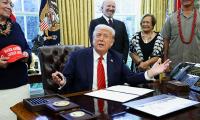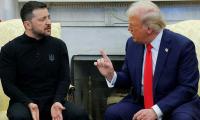ISLAMABAD: On the force of its majority of two votes, the government is determined to bulldoze the appointment of Prime Minister Imran Khan’s two choice nominees as the members of the Election Commission of Pakistan (ECP) in the bipartisan parliamentary committee scheduled to meet on Tuesday.
The selection of two ECP members has been stalled in the absence of customary consultations between the prime minister and leader of the opposition in the National Assembly Shehbaz Sharif since July 26 when Altaf Qureshi and Irshad Qaiser, who had represented Punjab and Khyber Pakhtunkhwa (KP) respectively, had retired, creating the vacancies.
In the 12-member parliamentary committee on the appointment of the chief election commissioner (CEC) and ECP members, the ruling coalition has seven lawmakers while the opposition parties have five legislators. The representatives of the Pakistan Tehreek-e-Insaf (PTI) and its allies are Dr Shirin Mazari (chairperson), Pervez Khattak, Asad Umar, Shafqat Mahmood, Kamil Ali Agha (Pakistan Muslim League-Q), Hidayatullah (ex-tribal areas), Khalida Ateeb (Muttahida Qaumi Movement-Pakistan or MQM-P). The five opposition delegates in the parliamentary panel are Raja Pervez Ashraf, Rana Sanaullah, Shaza Fatima Khawaja, Shahida Akhtar Ali (Jamiat-e-Ulema-e-Islam-Fazl) and Tahir Bizenjo (National Party).
The choice of the ECP members in the way it is being pursued may generate more controversy as the opposition is likely to reject the process. The ECP which is being battered by the government for not obliging it, will become further controversial.
This will be the first time that a government will be pushing its favourite nominees for appointment as the ECP members. Previously, attempts were made to evolve a consensus that finally succeeded. Even during the tenure of the present government, Sikandar Sultan Raja and two ECP members had been picked through an agreement that was reached in informal contacts between the two sides. President Dr Arif Alvi had notified two government’s selectees as the ECP members, but their appointment had been struck down by the Islamabad High Court (IHC), which had instructed Speaker Asad Qaiser to talk to the two sides to work out an agreement within a specified timeframe. The process had produced results.
On the eve of its crucial session, the composition of the parliamentary committee has also been changed. Earlier, it had consisted of five PTI leaders, Dr Mazari, Pervez Khattak, Asad Umar, Shafqat Mahmood and Azam Swati (now excluded possibly because of his virulent outburst against the CEC and ECP for which he is facing proceedings in the ECP). The government also had the support of another member, Naseebullah Bazai belonging to the Balochistan Awami Party (BAP), who has now been removed from the committee.
In place of Azam Swati and Naseebullah Bazai, Kamil Ali Agha of the PML-Q and Hidayatullah from the former tribal areas have been inducted in the panel. Additionally, Khalida Ateeb of the MQM-P has been taken in the committee. Earlier, the government had an edge of just one vote while it now has a lead of two votes.
Similarly, Pakistan People’s Party (PPP) leader Dr Sikandar Mandhro and Dr Nisar Cheema of the PML-Nawaz have also been removed from the committee. Rana Sanaullah and Tahir Bizenjo have been inducted in their place. Previously, the PPP had two representatives in the forum (Raja Pervez Ashraf and Dr Mandhro) while it is now left with only one (Raja Pervez Ashraf).
The lead of two votes is more than enough to get the prime minister’s choices installed as the ECP members as the forum takes decisions either through consensus or majority.
To start the process of choosing the ECP members, the prime minister had sent a letter to the opposition leader on Aug 26, proposing three names each for the ECP members from Punjab and KP. For Punjab, he had recommended the names of Ahsan Mahboob, Raja Amer Khan and Dr Syed Pervaiz Abbas. For KP, he had suggested the names of retired Justice Ikramullah Khan, Faridullah Khan (currently chairman of the provincial public service commission) and Muzammil Khan.
In response, Shehbaz Sharif had rejected all these proposals and instead suggested in a letter on September 17 the names of retired Justice Tariq Iftikhar Ahmed, Muhammad Javed Anwar, retired Justice Mushtaq Ahmed, Khalid Masood Chaudhry, Irfan Qadir and Irfan Ali. He had also expressed his displeasure that the government had not followed the Supreme Court’s ruling which required the premier’s “serious and meaningful” consultations with him. He had proposed the names after consultations with the leaders of other opposition parties, including the Pakistan People’s Party (PPP).
The ECP members enjoy immense powers, almost like the CEC, under the Elections Act. Before the unanimous enactment of this law in 2010, the CEC used to have more authority than the ECP members. Now, the ECP comprises five appointees – the CEC and four ECP members. I
“Farmers grow wheat, the country gets flour otherwise, it will affect everyone.” says Abbasi
Imran Shafiq Advocate says during previous hearing that after amendment to PECA Act, no journalist would be able to...
CJP was heading three-member bench hearing appeals of Punjab government against bails granted to accused of May 9...







